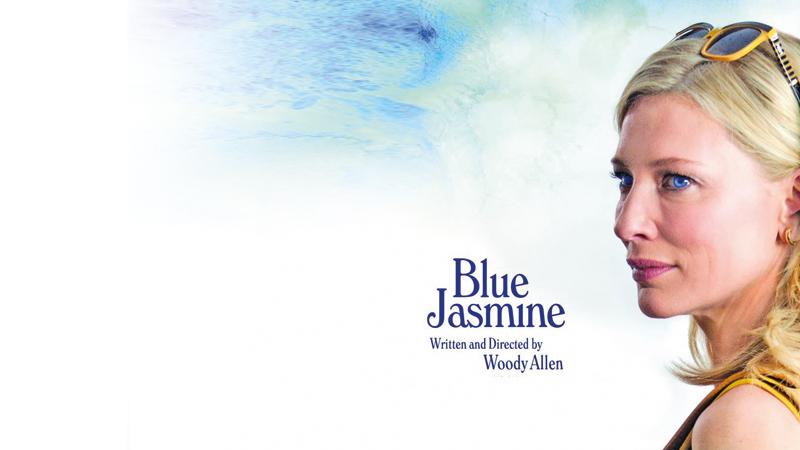
‘Blue Jasmine’ is a 2013 American comedy-drama film written and directed by Woody Allen. The film tells the story of a formerly rich Manhattan socialite (Cate Blanchett) who falls on hard times and has to move into her working-class sister's (Sally Hawkins) apartment in San Francisco.
The film received a limited release on July 26, 2013, in New York and Los Angeles, before expanding nationwide on August 23, 2013. The film was met with critical acclaim, particularly for Blanchett's performance. Blanchett won the Academy Award for Best Actress, and Hawkins and Allen were nominated for Best Supporting Actress and Original Screenplay, respectively. Blanchett also won the Golden Globe Award, the SAG Award, and the BAFTA Award for Best Actress in a Leading Role. The film was also a box office success, earning $99.1 million worldwide against a budget of $18 million.
 In preparation for her role, Blanchett explained, "I did a lot of people watching. I drank my fair share of rosé. In the end I had to play the anti-heroine that Woody's written, but of course I thought about the Madoff scandal, because that's the holocaust of the financial crisis. And there are many, many women like that. I followed them like everybody else did, but as an actress you go back and you're slightly more forensic about those relationships.”
In preparation for her role, Blanchett explained, "I did a lot of people watching. I drank my fair share of rosé. In the end I had to play the anti-heroine that Woody's written, but of course I thought about the Madoff scandal, because that's the holocaust of the financial crisis. And there are many, many women like that. I followed them like everybody else did, but as an actress you go back and you're slightly more forensic about those relationships.”
The film was shot in 2012 in New York City and San Francisco. Letty Aronson, Stephen Tenenbaum, and Edward Walson served as the film's producers. Sony Pictures Classics distributed the film, marking the sixth collaboration between the label and Allen.
The outfits for Blanchett's Jasmine were an important part of her character and narrative, but they were difficult to assemble because of a very limited total costume budget of $35,000. To supplement this, costume designer Suzy Benzinger used her and Woody Allen's connections with various fashion houses to borrow some of the more expensive items for the production.
These included Fendi, Chanel, Hermès, Oscar de la Renta and Carolina Herrera. Blanchett also helped, by using her relationship with Louis Vuitton to secure monogrammed luggage for the production, after Vuitton refused Benzinger's request. Karl Lagerfeld supplied two copies of the white Chanel bouclé jacket which Jasmine wears throughout the film, one brand new for the flashback scenes of Jasmine's affluent life in New York, and one for the San Francisco scenes which Benzinger distressed by soaking in fabric softener to give it the appearance of overuse.
Release
‘Blue Jasmine’ had a limited release at six theatres in Los Angeles and New York City on July 26, 2013, and expanded nationwide on August 23, 2013. Woody Allen refused to release the film in India because the country requires a blurb to be inserted at the bottom of any scene where a character is smoking. This is in addition to health warnings that need to be shown at the beginning and end of the film.
Critical response
Rotten Tomatoes gives the film an approval rating of 91%, with an average rating of 8.1/10, based on 228 reviews. The website's critical consensus states, "Woody Allen's Blue Jasmine finds the director in peak late-period form — and benefiting from a superb cast led by Cate Blanchett." On Metacritic, the film received a score of 78/100 based on 47 reviews, indicating "generally favorable reviews".
Early reviews suggested the film would be rated very highly among Allen's recent offerings, and praised Blanchett's performance as one of her strongest, if not the best of her career: David Denby of The New Yorker stated that "in all, this is the strongest, most resonant movie Woody Allen has made in years".
Mick LaSalle, in San Francisco Chronicle, wrote, "Blanchett in Blue Jasmine is beyond brilliant, beyond analysis. This is jaw-dropping work, what we go to the movies hoping to see, and we do. Every few years." Andrew Dice Clay's performance was also critically praised in the film.
Some critics have argued the film is Allen's response or tribute to the Tennessee Williams play A Streetcar Named Desire, as it shares a very similar plot and characters. It also features cast members who have previously been associated with the play: Baldwin played the role of Stanley Kowalski on stage in 1992 and in the 1995 adaptation of the play, while Blanchett played the leading role of Blanche DuBois in the Australian production of the play staged by the Sydney Theatre Company in 2008. Other critics and cultural commentators theorized that the story of Jasmine as a "shrill narcissist falling apart" and "in a crisis of self-flagellation after living in denial for years" was modeled on Allen's former companion, Mia Farrow, and that the film is a response to their high-profile and acrimonious break-up.
Accolades
At the 2014 Academy Awards ceremony, ‘Blue Jasmine’ had three nominations: Best Actress for Blanchett, Best Supporting Actress for Hawkins and Best Original Screenplay for Allen. Blanchett was the sole winner.
At the 2014 Golden Globe Awards ceremony, the film had two nominations: Best Actress in a Motion Picture – Drama for Blanchett and Best Supporting Actress – Motion Picture for Hawkins, with Blanchett going on to win. Blanchett also won Best Actress at the BAFTAs, Screen Actors Guild Awards, and Independent Spirit Awards. Allen's screenplay was also nominated at the Writers Guild of America Awards and the film was nominated for or won dozens of other awards worldwide.

